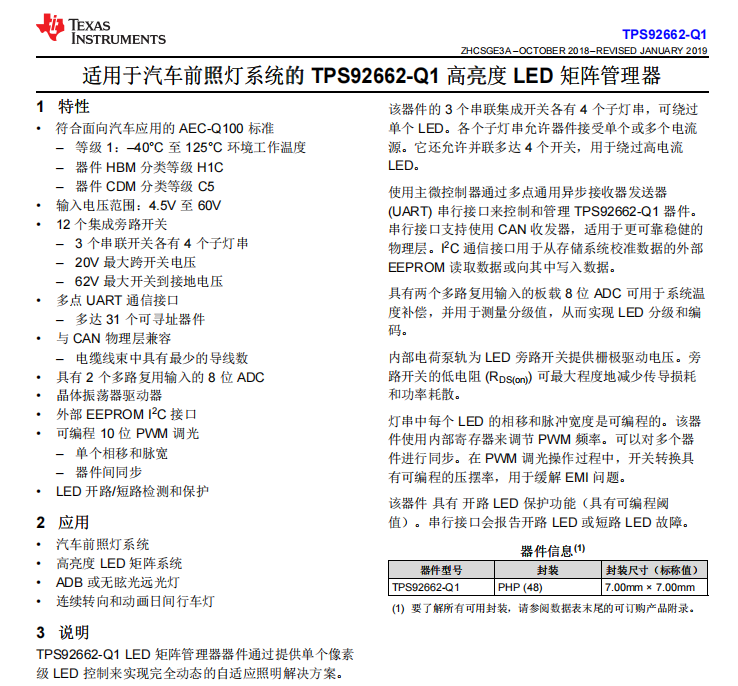Tps92662qphprq1 LED lighting driver has the lowest price, and the actual order must be completed
Characteristics of tps92662-q1
Comply with aec-q100 standard for automotive applications
Class 1: - 40 ° C to 125 ° C ambient operating temperature
Device HBM class H1C
Device CDM classification level C5
Input voltage range: 4.5V to 60V
12 integrated bypass switches
Three series switches each have four sub lamp strings
20V maximum cross switch voltage
62V maximum switch to ground voltage
Multipoint UART communication interface
Up to 31 addressable devices
Compatible with can physical layer
Minimum number of wires in cable harness
8-bit ADC with 2 multiplexed inputs
Crystal oscillator driver
External EEPROM I2C interface
Programmable 10 bit PWM dimming
Single phase shift and pulse width
Synchronization between devices
Led open / short circuit detection and protection
Description of tps92662-q1
Tps92662-q1 LED matrix manager device realizes a fully dynamic adaptive lighting solution by providing a single pixel level led control.
The 3 Series Integrated switches of the device each have 4 sub lamp strings, which can bypass a single LED. Each sub lamp string allows the device to accept single or multiple current sources. It also allows up to four switches to be connected in parallel for winding over current LEDs.
The tps92662-q1 device is controlled and managed by the main microcontroller through the multipoint universal asynchronous receiver transmitter (UART) serial interface. The serial interface supports the use of can transceiver, which is suitable for more reliable and robust physical layer. The I2C communication interface is used to read data from or write data to an external EEPROM that stores system calibration data.
An on-board 8-bit ADC with two multiplexed inputs can be used for system temperature compensation and for measuring the grading value to achieve led grading and coding.
The internal charge pump rail provides the grid drive voltage for the LED bypass switch. The low resistance (RDS (on)) of the bypass switch minimizes conduction loss and power dissipation.
The phase shift and pulse width of each LED in the lamp string are programmable. The device uses an internal register to adjust the PWM frequency. Multiple devices can be synchronized. During PWM dimming operation, the switch conversion has a programmable voltage swing rate, which is used to alleviate EMI problems.
Comply with aec-q100 standard for automotive applications
Class 1: - 40 ° C to 125 ° C ambient operating temperature
Device HBM class H1C
Device CDM classification level C5
Input voltage range: 4.5V to 60V
12 integrated bypass switches
Three series switches each have four sub lamp strings
20V maximum cross switch voltage
62V maximum switch to ground voltage
Multipoint UART communication interface
Up to 31 addressable devices
Compatible with can physical layer
Minimum number of wires in cable harness
8-bit ADC with 2 multiplexed inputs
Crystal oscillator driver
External EEPROM I2C interface
Programmable 10 bit PWM dimming
Single phase shift and pulse width
Synchronization between devices
Led open / short circuit detection and protection
Description of tps92662-q1
Tps92662-q1 LED matrix manager device realizes a fully dynamic adaptive lighting solution by providing a single pixel level led control.
The 3 Series Integrated switches of the device each have 4 sub lamp strings, which can bypass a single LED. Each sub lamp string allows the device to accept single or multiple current sources. It also allows up to four switches to be connected in parallel for winding over current LEDs.
The tps92662-q1 device is controlled and managed by the main microcontroller through the multipoint universal asynchronous receiver transmitter (UART) serial interface. The serial interface supports the use of can transceiver, which is suitable for more reliable and robust physical layer. The I2C communication interface is used to read data from or write data to an external EEPROM that stores system calibration data.
An on-board 8-bit ADC with two multiplexed inputs can be used for system temperature compensation and for measuring the grading value to achieve led grading and coding.
The internal charge pump rail provides the grid drive voltage for the LED bypass switch. The low resistance (RDS (on)) of the bypass switch minimizes conduction loss and power dissipation.
The phase shift and pulse width of each LED in the lamp string are programmable. The device uses an internal register to adjust the PWM frequency. Multiple devices can be synchronized. During PWM dimming operation, the switch conversion has a programmable voltage swing rate, which is used to alleviate EMI problems.
The device has open circuit led protection function (with programmable threshold). The serial interface will report an open LED or a short led fault.

